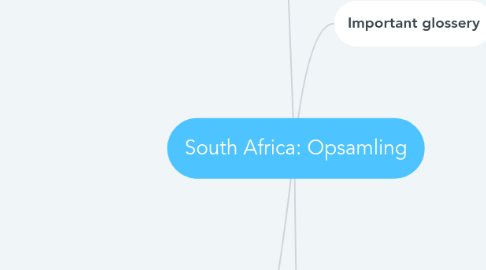
1. The texts - use literary terms
1.1. The Bench
1.1.1. Narrative technique
1.1.1.1. 3. person limited narrater
1.1.1.2. Only Karlie's point of view - sympathy
1.1.1.3. identification with the main character
1.1.1.4. Contrast
1.1.1.4.1. Positive adjectives describing black Africans
1.1.1.4.2. Negative adjective describing white Africans
1.1.1.5. The characters are indirectly described
1.1.1.5.1. “look where you’re going, you black bastard" (p.214)
1.1.1.6. Narrative methods
1.1.1.6.1. Dialog
1.1.1.6.2. Report
1.1.1.6.3. Description
1.1.2. The title
1.1.2.1. The title symbolizes the race discrimination. there was in South Africa at this time.
1.1.2.2. It shows how it was possible to challenge the apartheid system.
1.1.2.3. “WE MUST CHALLENGE THE RIGHT OF ANY PEOPLE WHO SEE FIT TO SEGREGATE HUMAN BEINGS SOLELY ON GROUNDS OF PIGMENTATION” (P.1, L.26-29)
1.2. Mandela, Inaugural Speech
1.2.1. The Rhetorical Pentagon
1.2.1.1. Speaker
1.2.1.1.1. Nelson Mandela. He just won the election with the ANC. His was fighting against segregation and went to prison.
1.2.1.2. Circumstances
1.2.1.2.1. He is the first African president in South Africa. He gave the speech because he just got elected as president. This was the first democratic election in SA ever
1.2.1.3. Topic
1.2.1.3.1. The countrys background
1.2.1.3.2. what he wants to accomplish in the future
1.2.1.3.3. A Rainbow Nation
1.2.1.4. Audience
1.2.1.4.1. The population of South Africa
1.3. 20 years after Apartheid
1.3.1. Improving
1.3.1.1. * globalized economy * most advanced country in Africa * millions of blacks have been educated and risen out of poverty
1.3.2. Not improving
1.3.2.1. * corruption * many blacks have not improved their lives * AIDS/HIV rates among the highest * unemployment high * “Im glad that Nelson Mandela is dead” - he wouldn’t like to see his party like this * only tenderpreneurs are advancing
1.4. Ramaphosa, State of the Nation Address
1.4.1. Figurative language
1.4.1.1. “we are not merely honoring the past, we are building the future”
1.4.1.1.1. This is an antithesis as he uses a contrasts the past with the future to exemplify what exactly is the better version of SA
1.4.1.2. “we are continuing the long walk he began”
1.4.1.2.1. Metaphor
1.4.1.3. Forms of appeal
1.4.1.3.1. Pathos
1.4.1.3.2. Ethos
1.4.1.3.3. Logos
2. Draw parallels
2.1. The short story "The Bench" and the speech by Nelson Mandela "Inaugural address" both deal with the subject freedom and discrimination, in response to the time where apartheid ruled South Africa
2.2. In the short story there is a lot of adjectives to describe the characters and the setting. Whereas in the speech there is a lot of personal pronouns and figurative language to make a sense of community and to visualize the bad things that has happened and the goods to come to the audience.
2.3. In the text "20 years after Apartheid" and the Speech "State of the Nation Address" they both deal with the flaws South Africa still have not improved.
2.3.1. They both talk about: Not creating enough jobs, high HIV and AIDS rates and government corruption
2.4. Both wanting to unite the community - brings some of the same issues to mind: Mandela: * liberty * a united country * rebuilding a country for everyone/healing * freedom * justice All of these are also mentioned in Ramaphosa’s speech Both speeches was spoken by black Presidents of South Africa who needed to unite the community and face the same problems
2.5. There is also parallels between "Inaugural Address"and "State of the Nation Address"
3. Important glossery
3.1. Apartheid
3.1.1. The policy which segregated the races in South Africa from 1948-1990
3.2. Boers
3.2.1. The Dutch who settled in South Africa in 1652
3.3. The ANC
3.3.1. The African National Congress
3.4. Inaugural
3.4.1. Indsættesles
3.5. The Truth and Reconciliation commission
3.5.1. It was a court like organisation where people could come in and give there statements if something they did not think was fair had happened to them after apartheid or under apartheid
3.5.1.1. Perpetrators could get amnesty
3.6. Poverty
3.6.1. Fattigdom
3.7. Superior vs. Inferior
3.7.1. Overlegen vs. underlegen
3.8. Government corruption
3.9. High crime rate
3.10. Africaans
3.10.1. The language the Boers speak
3.11. Kaffir
3.11.1. A derogatory word for an African
3.12. Afrikaner
3.12.1. The Boers
3.13. African
3.13.1. Indigenous (indfødte)
4. Historical facts
4.1. 1652 - the colonization of SA begins with the arrival of three Dutch ships at Table Mountain in the Cape - main one explaining why SA is so multi-cultural
4.2. 1910 - South Afrika became independent
4.3. 1912 - The ANC was established
4.4. 1948 - The nationalist party won the election and started the apartheid as the official policy unfortunate
4.5. 1962 - Nelson Mandela was arrested for 27 years
4.6. 1990 - president De klerk abolished apartheid
4.7. 1994 - first election for everyone
4.7.1. - NM is elected by parliament as first President of a democratic SA
